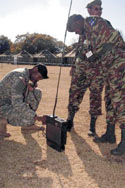Interoperability of African Systems Enhances Regional Security
 |
| The goal of the Africa Endeavor exercise is to develop interoperability among African nations’ armed forces and to foster a culture of information sharing during multinational operations. |
A multinational exercise is bringing African nations together by focusing on how they can cooperate across a range of operations that include conducting peacekeeping missions, coordinating disaster relief and responding to humanitarian emergencies. The event will improve communications and collaboration in a region where military cooperation is uncommon, and it will develop new techniques and standards to permit nations to interoperate.
Africa Endeavor 2007 emphasizes interoperable information sharing using legacy systems and equipment. Taking place this July in
The event’s origins date to 2003, when leaders recognized a growing need for an Africa-based command and control exercise similar to Combined Endeavor. Gen. Verbeck notes that a variety of diplomatic and logistical considerations led to three years of negotiations before Africa Endeavor was first held in 2006.
A major Africa Endeavor requirement was that African nations host the event. To achieve this, Gen. Verbeck says that EUCOM works with the African Union (AU), headquartered in
Africa Endeavor and Combined Endeavor differ technologically because most African nations’ military communications systems are not as modern as European equipment. Gen. Verbeck observes that this lack of modernization includes obsolete systems and capabilities and an inability to interoperate. “When we first went to
Held in June 2006, the first Africa Endeavor consisted of 25 regional nations. By comparison, the general notes that only 10 countries attended the first Combined Endeavor. “Out of the 53 nations in
Gen. Verbeck shares that the event has created a newfound sense of cooperation among the continent’s armed forces. The general notes that during the closing ceremonies of last year’s Africa Endeavor, he stood next to an African officer who was deeply moved by the sight of nations that had never operated together in the past now standing together in review. An important part of the first Africa Endeavor was demonstrating the basic importance of information sharing. Systems and communications equipment were of secondary importance, he says.
The key theme for Africa Endeavor 2007 is the operational relevance of information sharing. Another focus is enabling the AU and its regional headquarters to have a strong command and control capability based on solid communications, computer, and command and control standards to help them manage the process of sharing information across the continent.
 |
| Many African nations have outdated high frequency radio equipment. Africa Endeavor 2006 demonstrated how these old systems could be made to interoperate for voice and data communications. |
Each regional meeting is held in a different nation, and that nation has a say in the exercise. The general adds that this meeting pattern mirrors Combined Endeavor, which holds planning sessions in various participating nations during the course of a year. Nations volunteer to host meetings, and the general adds that the cycle of gatherings helps to create an environment in which nations can think together rather than individually about regional issues. He explains that this is a challenge in
Gen. Verbeck emphasizes that no single gathering is more important than another. “The exercise at the end is the icing on the cake,” he stresses. The meetings leading up to the event bring people together as they decide what the critical issues are and define the solutions to those issues. When building interoperability among countries and among civil and military organizations, collaboration is vital, he adds.
All of the communications architectures, standards and procedures being designed for Africa Endeavor are based on scenarios developed by the AU. The event uses six of these scenarios to form a baseline, says Lt. Col. Kevin Warthon, USA, exercise director, Africa Endeavor, Stuttgart. These scenarios address advisory and staff components, AU coordination of brigade headquarters, AU military missions, tactical missions under United Nations mandate, AU cooperation with other organizations and AU intervention operations in regions such as
Information sharing is not limited to military operations. Much of the interoperability promoted during Africa Endeavor focuses on humanitarian and disaster relief missions. Gen. Verbeck adds that one of the most mature of the five regional AU headquarters is the Economic Community of Western African States, which includes humanitarian aid and disaster relief as part of its mandate. Operations in Africa emphasize peacekeeping rather than the peacemaking missions underway in
Although Africa Endeavor 2007’s theme will not differ greatly from last year’s topic, new capabilities and technologies will be introduced into the architecture, which Col. Warthon states is important to meeting interoperability requirements.
The main challenge from the event’s inception has been to educate the region’s nations about the value of interoperability, Gen. Verbeck explains. He notes that in many African languages, the word “intelligence” can be loosely translated to mean spying and has a negative connotation. The exercise stresses sharing and what can be accomplished by it. Once nations move past their reluctance to share information with each other, the next impediment to overcome is the inability to exchange data.
Gen. Verbeck notes that the predominant communications mode in
Impediments remain such as a lack of equipment, manpower, training and funds. Col. Warthon explains that Africa is a huge area of responsibility and that a number of voids exist in the
Diplomacy played a key role in convincing many African nations to participate in the exercise. Unlike Combined Endeavor, which built on a half-century of military and diplomatic cooperation among European nations, Africa Endeavor represents new ground for all of the participants. Gen. Verbeck notes that the first Combined Endeavor events focused on a warfighting environment based on Cold War experiences. Africa Endeavor, however, focuses on information sharing and a command and control chain that allow diverse nations to conduct peacekeeping operations.
Africa Endeavor covers a range of scenarios from peacekeeping to disaster relief. Gen. Verbeck describes this as “active security.” Active security is a follow-on concept to the military term phase zero. From a military perspective, phase one is preparation to go to war; phase two is deployment; phase three is warfighting; and phase four is redeployment. All of these phases focus on warfare. “Phase zero is a concept of how do you prepare a battlefield so that you never have to go to war,” he explains.
Col. Warthon notes that at the most recent Africa Endeavor meeting in the
EUCOM’s European partners also played a key role in last year’s Africa Endeavor. The general notes that these nations served not only as mentors but also as goodwill ambassadors to the African nations. “At every step, countries provided over-the-shoulder assistance on equipment they had familiarity with. The reality is most of the European countries have access to HF and things related to that kind of technology and they are familiar with former Soviet types of equipment,” he says.
The colonel believes that another reason behind European nations’ enthusiastic assistance is their proximity to
The general adds that the AU and the European Union recently met to determine ways to work together and to develop principles to guide progress. The standards agreed to were good governance and communications. “What we’re doing with Africa Endeavor and certainly with partners from Combined Endeavor is meeting the basic parts of the tenants of achieving good governance and communications. This is a groundbreaking forum in this part of the world that will certainly bring these folks closer together,” he says.
Africa Endeavor will be handed off to the U.S. Africa Command when it becomes fully operational in September 2008.
Web Resources
African
The U.S. Defense Department is in the process of establishing a new regional command that will be solely responsible for the African continent. The U.S. Africa Command (AFRICOM) will assume responsibilities for the region from the three combatant commands that now oversee the continent, the U.S. Central Command (CENTCOM), U.S. European Command (EUCOM) and U.S. Pacific Command (PACOM). This three-command structure evolved from a Cold-War-era strategic scenario, explains Rear Adm. Robert Moeller, USN, executive director, AFRICOM Implementation Planning Team, The AFRICOM’s mission is to help African nations build the capacities and capabilities they need to improve political and economic stability for the continent. Adm. Moeller notes that the command is focused on preventing or mitigating events such as natural and humanitarian disasters. It also will work with its regional partners to head off or reduce trends that lead to crisis and conflict. “The idea is to get well ahead of those kinds of challenges and problems so that we can reverse those trends and reinforce the conditions that lead to a stable environment,” he says. Adm. Moeller states that The admiral predicts that the command will operate much of the time by consulting and working closely with regional nations to form collaborative partnerships. He observes that many international organizations and non-African nations also are interested in creating the conditions for stability on the continent. In the future, AFRICOM will manage and host events such as Africa Endeavor. Adm. Moeller notes that the command is only now in the earliest stages of planning and establishing its overall architecture, but he adds that AFRICOM will ultimately assume responsibilities for the continent from EUCOM, CENTCOM and PACOM. “We will have a very comprehensive plan for the transfer of authority of all of those kinds of [mission and management] activities,” he says. Because AFRICOM’s mission goes beyond warfighting, it will include substantial As the command is stood up and moves forward, Adm. Moeller sees it as a multi-agency effort within the AFRICOM is scheduled to be fully operational in September 2008. The admiral’s immediate plan is to expand the core headquarters staff to match its mission requirements. Detailed planning, which is occurring in parallel with the staff expansion, will permit the command to assume its regional responsibilities and activities from the three other commands on schedule. The admiral notes that it is the command’s goal to locate its headquarters in Handing off responsibilities from the three combatant commands to AFRICOM will be a complex procedure. Because major combatant commands are not regularly established, personnel and resources must be identified and allocated. The admiral notes that it is early in the process but that establishing the command’s command, control, communications, computers and intelligence (C4I) structure will be the next challenge. |



Comments